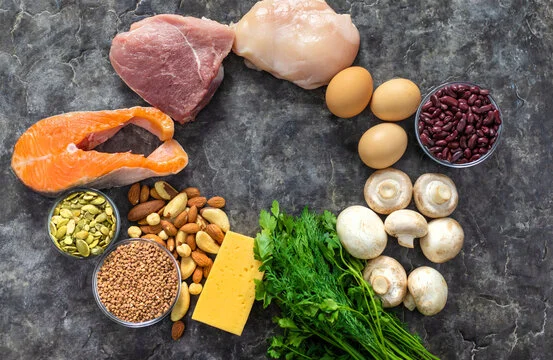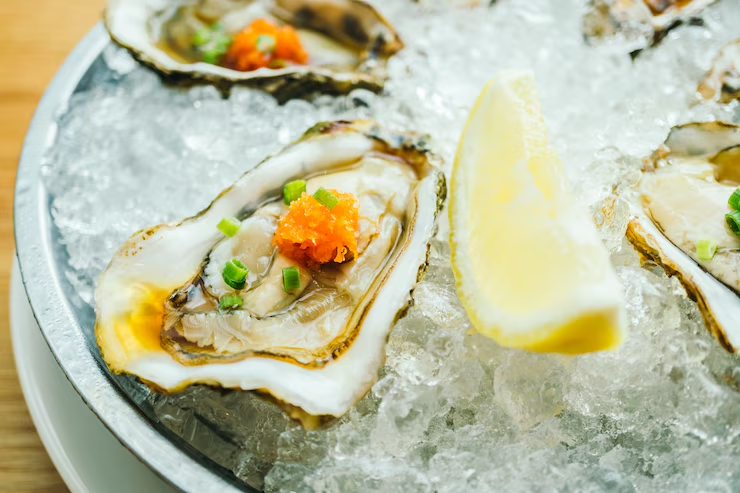Discover the best zinc-rich food for fertility, immunity, and skin health. Backed by clinical studies, this guide explores top dietary sources, benefits, and tips to optimize zinc absorption naturally.
Introduction
Zinc is one of the most powerful yet underrated trace minerals essential to human health. Involved in over 300 enzymatic processes, zinc plays a pivotal role in fertility, immune defense, and skin repair. Despite its importance, nearly 17% of the global population is at risk of zinc deficiency—especially in areas with limited access to animal-based foods.
In this comprehensive, science-backed article, we’ll explore the best zinc-rich food for fertility, immunity, and skin, drawing from recent clinical trials and nutrition texts like Present Knowledge in Nutrition (2023) and Biochemical, Physiological, and Molecular Aspects of Human Nutrition (2024).
Why Zinc Matters: More Than Just a Mineral
Zinc is vital for:
DNA synthesis and cell division
Immune cell activation (T-cells, neutrophils)
Hormone regulation (testosterone, progesterone)
Collagen production and wound healing
Since your body cannot store zinc, daily intake is essential.
Recommended Daily Allowance (RDA):
Men: 11 mg/day
Women: 8 mg/day (11–12 mg during pregnancy or lactation)
Zinc and Fertility: Fueling Reproductive Health
Male Fertility
Zinc is highly concentrated in the prostate and testes, where it:
Boosts sperm count and motility
A 2024 meta-analysis in Human Reproduction Update found that men with zinc levels >12 µmol/L had 37% higher sperm motility.
Protects sperm DNA
Zinc reduces oxidative damage, lowering miscarriage risk.
Female Fertility
Zinc supports ovarian function
Aids follicle maturation and estrogen synthesis
Improves IVF outcomes
A 2023 study in Fertility and Sterility linked optimal zinc intake to 22% higher embryo implantation rates.
Top 5 Zinc-Rich Foods for Fertility

Food Zinc (per serving) Key Benefit
Oysters 52 mg/100g (472% DV) Highest bioavailability; boosts testosterone
Pumpkin Seeds 2.2 mg/28g (20% DV) Rich in phytoestrogens for hormone balance
Grass-Fed Beef Liver 4.5 mg/100g (41% DV) Provides vitamin A for reproductive tissue
Sprouted Lentils 1.5 mg/½ cup (14% DV) Folate + zinc support ovulation
Eggs 1.3 mg/2 eggs (12% DV) Choline aids fetal brain development
Zinc and Immunity: Your Body’s First Line of Defense
Zinc supports both innate and adaptive immunity by:
Activating T-cells
Blocking viral replication (e.g., influenza viruses)
Reducing inflammation via cytokine modulation (IL-6, TNF-α)
A 2023 Cochrane review showed that zinc lozenges shortened cold duration by 33% when taken within 24 hours of symptoms.
Top 5 Zinc-Rich Foods for Immunity
Food Zinc (per serving) Key Benefit
Grass-Fed Beef 7 mg/100g (64% DV) Contains carnosine for antiviral support
Chickpeas (Cooked) 1.6 mg/½ cup (15% DV) Prebiotics enhance gut-immune function
Cashews 1.6 mg/28g (15% DV) Selenium + zinc fight oxidative stress
Greek Yogurt (Plain) 1.4 mg/200g (13% DV) Combines probiotics + zinc for gut health
Dark Chocolate (70–85%) 3.3 mg/100g (30% DV) Flavonoids reduce respiratory inflammation
Zinc and Skin Health: From Acne to Anti-Aging
Clinical studies highlight zinc’s benefits for skin:
Reduces acne by inhibiting C. acnes and controlling sebum
Accelerates wound healing via collagen stimulation
Protects against UV damage using zinc oxide in sunscreens
A 2024 JAMA Dermatology study found that 25 mg/day of oral zinc reduced moderate acne by 49% in 12 weeks.
Top 5 Zinc-Rich Foods for Skin Health

Food Zinc (per serving) Key Benefit
Hemp Seeds 3 mg/30g (27% DV) Omega-3s reduce inflammatory acne
Turkey (Dark Meat) 3 mg/100g (27% DV) Rich in zinc and skin-hydrating niacin
Cooked Spinach 0.8 mg/½ cup (7% DV) Lutein + zinc protect against photoaging
Oysters 52 mg/100g (472% DV) Balances copper and zinc for even tone
Quinoa (Cooked) 1.1 mg/½ cup (10% DV) High in lysine for skin repair
How to Optimize Zinc Absorption
Boost the effectiveness of your zinc-rich diet with these proven tips:
Soak/Sprout legumes and seeds
Reduces phytates by up to 60% (Food Chemistry, 2024)
Pair with Vitamin C
Orange juice can increase zinc absorption by 50% (Nutrients, 2023)
Limit coffee/tea intake around meals
Tannins bind zinc—wait an hour post-meal
Prioritize animal-based sources
Heme zinc from meat/shellfish is 2.5x more bioavailable than plant sources
Who’s Most at Risk of Zinc Deficiency?
Vegetarians/Vegans: Phytates in legumes and grains inhibit absorption
Pregnant Women: Increased fetal demands
Older Adults: Reduced stomach acid
Athletes: Zinc loss through sweat
Symptoms of deficiency
Frequent colds and infections, hair loss, , hormonal imbalances, white spots on nails, poor wound healing, loss of taste/smell and skin issues.
Conclusion
Incorporating zinc-rich food for fertility, immunity and skin—like oysters, beef, pumpkin seeds, and sprouted lentils—can significantly enhance your health. By optimizing absorption and choosing nutrient-dense options, you can meet your zinc needs naturally and sustainably.
As always, consult a healthcare provider before making dietary changes, especially if you’re managing a health condition or pregnancy.
References
National Institutes of Health. (2023). Zinc Fact Sheet for Health Professionals.
Prasad, A.S. (2024). Zinc in Human Health. Academic Press.
Human Reproduction Update. (2024). Zinc and Male Fertility: A Systematic Review.
Hulisz, D. (2023). Efficacy of Zinc Against Common Cold Viruses. Journal of Pharmacy Practice.